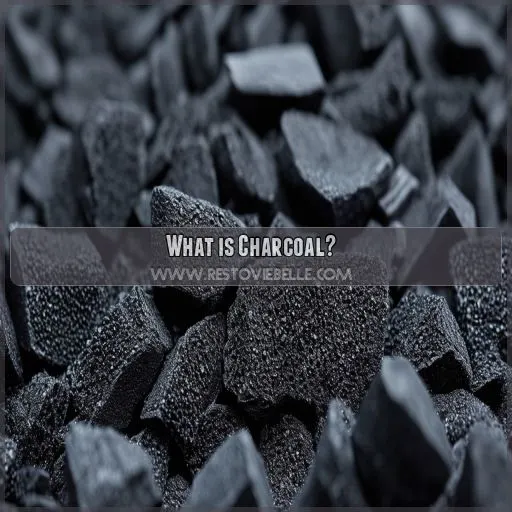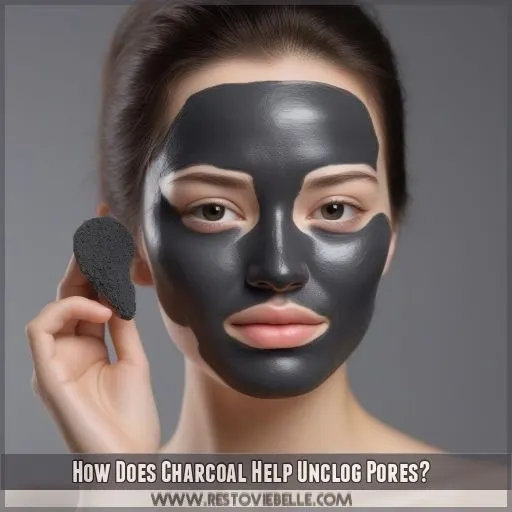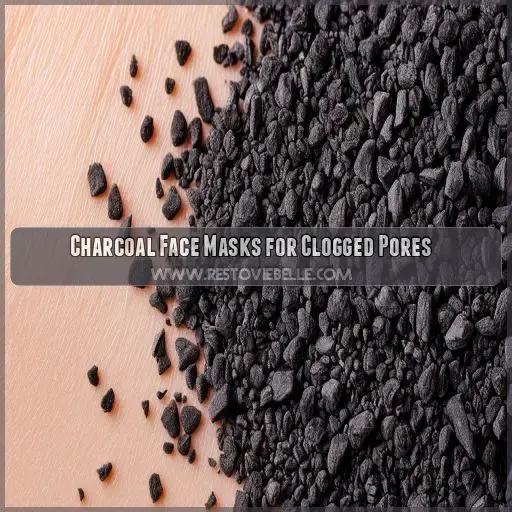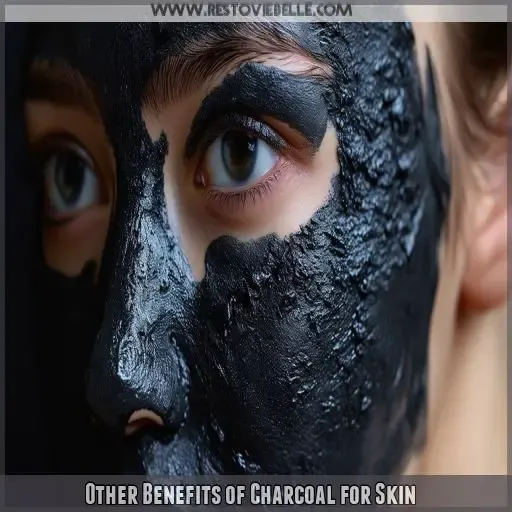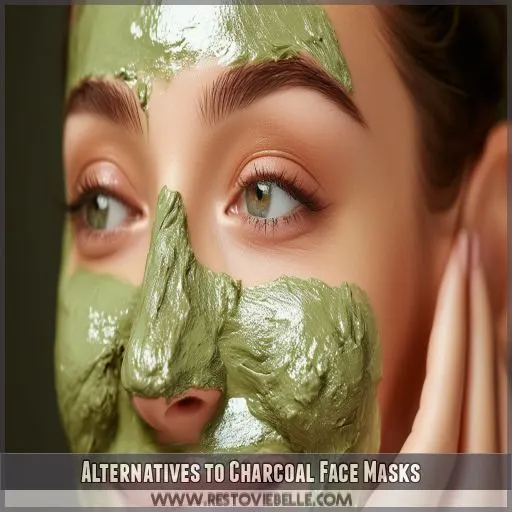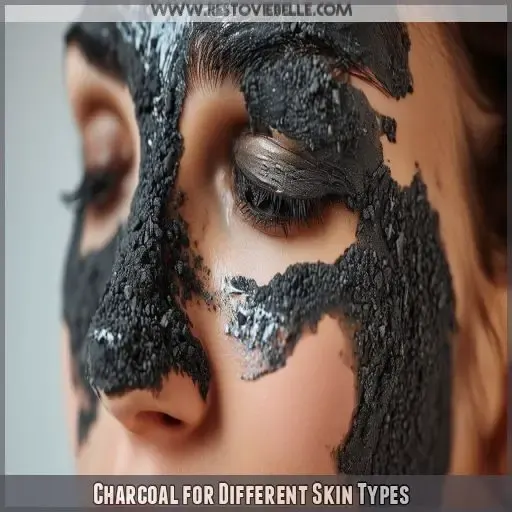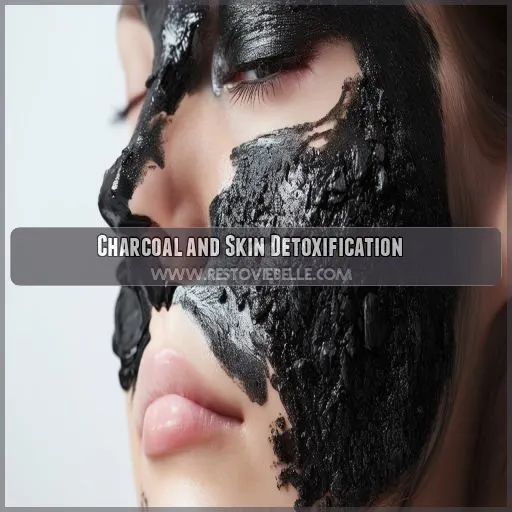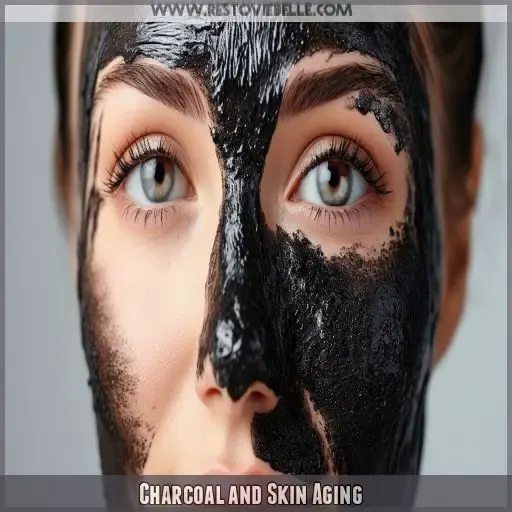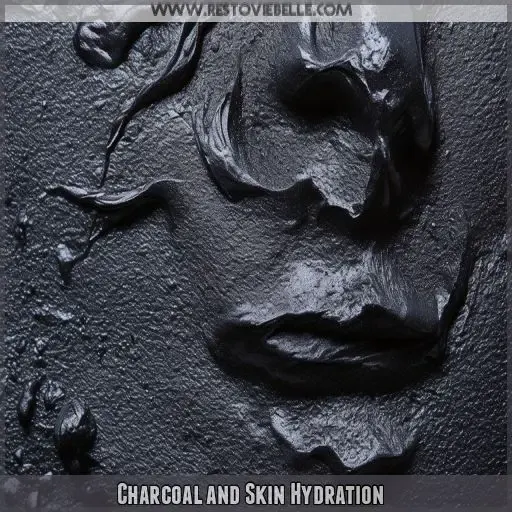This site is supported by our readers. We may earn a commission, at no cost to you, if you purchase through links.
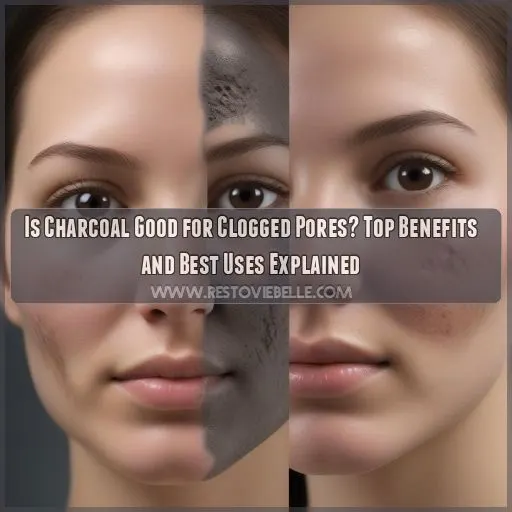 Charcoal’s great for unclogging pores by acting like a magnet to absorb excess oil and impurities. It helps keep your skin clean, controls shine, and reduces pore congestion by removing dirt and toxins.
Charcoal’s great for unclogging pores by acting like a magnet to absorb excess oil and impurities. It helps keep your skin clean, controls shine, and reduces pore congestion by removing dirt and toxins.
Using activated charcoal face masks or cleansers can exfoliate dead skin cells, leaving your complexion clearer.
Charcoal doesn’t just stop there—it also fights blackheads and can help reduce acne, making it a versatile addition to your skincare routine. Wondering how to make the most of it and other benefits it offers? Keep going, and you’ll uncover more about harnessing charcoal’s powers for radiant skin.
Table Of Contents
- Key Takeaways
- Is Charcoal Good for Clogged Pores?
- What is Charcoal?
- How Does Charcoal Help Unclog Pores?
- Charcoal Face Masks for Clogged Pores
- Other Benefits of Charcoal for Skin
- Alternatives to Charcoal Face Masks
- Charcoal for Different Skin Types
- Charcoal and Skin Detoxification
- Charcoal and Skin Aging
- Charcoal and Skin Hydration
- Frequently Asked Questions (FAQs)
- Is charcoal good for clogged pores?
- Does activated charcoal unclog pores?
- Does a charcoal face mask help clog pores?
- Is charcoal good for pore congestion?
- Can activated charcoal help with acne?
- Why should you use charcoal to clean your skin?
- Can men use charcoal face masks effectively?
- Are there natural sources of charcoal?
- How often should you use charcoal masks?
- Do charcoal masks help with acne scars?
- Can charcoal masks be combined with other treatments?
- Conclusion
Key Takeaways
- Charcoal is your pore-unclogging secret weapon: Like a magnet, it draws out gunk, dirt, and excess oil, leaving your skin feeling fresh and clean.
- Wave goodbye to pesky blackheads: Charcoal has got your back in the fight against blackheads, helping you achieve a clearer complexion.
- Say hello to a brighter, smoother you: Charcoal’s exfoliating powers gently buff away dead skin cells, revealing a radiant, glowing you.
- Balance is key: Charcoal helps regulate oil production, keeping your skin happy and healthy, not too dry or too oily.
Is Charcoal Good for Clogged Pores?
Yes, charcoal is good for clogged pores. It helps by absorbing excess oil and removing impurities, leading to clearer skin .
What is Charcoal?
Charcoal, derived from sources like coconut shells and bamboo, is a powerhouse in skincare due to its porous structure that helps absorb excess oil and impurities. It can deeply cleanse and exfoliate, making it highly effective in managing clogged pores and enhancing overall skin health.
Types of Charcoal
Charcoal production involves creating various types like activated charcoal, binchotan charcoal, and those derived from coconut shells, bamboo, and oak. In skincare, activated charcoal is celebrated for its ability to filter impurities, absorb excess sebum, and unclog pores, providing a sustainable choice for deep cleansing. Its porous nature enhances its filtration capabilities.
Benefits of Charcoal in Skincare
Charcoal, derived from natural sources like coconut shells and bamboo, offers numerous skincare benefits. Its porous structure helps absorb excess oil, control shine, and reduce pore congestion, thereby effectively unclogging pores. Additionally, charcoal properties aid in skin purification, skin brightening, and fighting environmental pollutants, making it a valuable asset in charcoal masks for clogged pores.
How Does Charcoal Help Unclog Pores?
Charcoal helps unclog pores by absorbing excess oil and impurities from your skin, effectively reducing the chance of clogging. It also exfoliates dead skin cells, leaving your complexion clearer and smoother .
Absorbing Excess Oil
Charcoal properties in skincare include absorbing excess oil, which helps to unclog pores:
- Charcoal masks absorb excess oil, preventing clogged pores.
- Effective mask formulations target oil-rich areas.
- Suitable DIY options for oily or combination skin.
- Sensitivity must be considered.
Removing Impurities
Next, charcoal’s inherent pore cleansing capacity is remarkable for removing impurities and purifying the skin. Functioning like a magnet, it effectively draws out and detoxifies by eliminating blackheads and absorbing excess oil, particularly with binchotan charcoal, helping manage enlarged pores.
Exfoliating Dead Skin Cells
Moving on, charcoal face masks exfoliate dead skin cells, helping unclog pores and revealing brighter skin. Activated charcoal acts like a magnet, pulling out impurities, blackheads, and excess oil, making your skin look and feel cleaner and smoother .
Charcoal Face Masks for Clogged Pores
Charcoal face masks can effectively unclog pores by absorbing excess oil and removing impurities from your skin . It’s important to choose the right type of charcoal face mask and use it correctly to avoid irritation and achieve the best results .
Types of Charcoal Face Masks
Charcoal face masks come in various forms, each specially designed to tackle clogged pores. Consider:
- Peel-off masks: Efficient but might irritate sensitive skin.
- Clay masks: Absorb oil and impurities.
- Sheet masks: Convenient for quick application.
How to Use Charcoal Face Masks
To use charcoal face masks for clogged pores, start by washing your face to pre-exfoliate. Apply the mask to your T-zone or areas with blackheads only. Leave it on as directed, then rinse off with a gentle cleanser.
Precautions When Using Charcoal Face Masks
When using charcoal face masks, avoid peel-off types to prevent over-exfoliation and irritation. Test for allergies before full use, and avoid applying on dry or sensitive skin to reduce the risk of drying effects or skin sensitivity.
Other Benefits of Charcoal for Skin
Beyond unclogging pores, charcoal can help reduce acne by absorbing excess oil and impurities from your skin . Additionally, it can minimize pores and brighten your complexion, leading to a more even and radiant skin appearance .
Reducing Acne
Using a charcoal mask can help with reducing acne by balancing oil, purifying your skin, and gently exfoliating. It targets pore congestion and blackhead formation, making your skincare regimen more effective for acne prevention and maintaining clear skin .
Minimizing Pores
Minimizing pores with charcoal face masks is possible due to their ability to absorb excess oil and impurities. To optimize results:
- Avoid masks causing charcoal allergy or irritation.
- Opt for organic product recommendations.
- Confirm proper mask removal.
- Consider alternative exfoliators.
Brightening Complexion
Charcoal face masks, with their exfoliating properties, can brighten your complexion by removing dead skin cells and unclogging pores. These masks also aid in blackhead removal and overall pore cleansing, contributing to more radiant and clearer skin .
Alternatives to Charcoal Face Masks
If you’re looking for alternatives to charcoal face masks, chemical exfoliators like alpha hydroxy acids and beta hydroxy acids can help loosen blackheads gently . Additionally, clay masks and double cleansing are effective methods for keeping your pores clear and your skin healthy .
Chemical Exfoliators
Besides charcoal, consider using chemical exfoliators for gentle exfoliation and pore refining. Acid peels containing alpha and beta hydroxy acids can loosen blackheads, promote skin renewal, and unclog pores, making them an effective alternative .
Clay Masks
Clay masks absorb impurities and excess oils, making them great alternatives to charcoal. They help unclog pores, improve collagen production, and maintain your skin’s pH balance with eco-friendly, natural ingredients while addressing various skin concerns effectively .
Double Cleansing
Double cleansing acts as an effective alternative to charcoal masks. Start with an oil-based cleanser to dissolve makeup and sunscreen, then follow up with a water-based cleanser to remove impurities. This method gently unclogs pores and eliminates charcoal sensitivity .
Charcoal for Different Skin Types
Charcoal can benefit different skin types by helping to balance oil levels, manage breakouts, and minimize pores . It’s important to choose the right formulation and use it cautiously, especially if you have sensitive or combination skin .
Oily Skin
Charcoal masks are a game-changer for oily skin. Thanks to their charcoal absorption, exfoliating properties, and skin purification, they tackle excess oil, prevent acne, and minimize pores effectively. Guarantee your oily skin gets the clean slate it deserves.
Combination Skin
With combination skin, using charcoal can be beneficial but should be done cautiously. Apply charcoal masks selectively on oily areas like your T-zone, and limit frequency to avoid irritation. Consider alternatives like clay masks for a balanced approach.
Sensitive Skin
When you’ve got sensitive skin, be cautious with charcoal masks to avoid irritation. Consider patch testing to prevent sensitive reactions and carefully check ingredient labels. Charcoal absorption can unclog pores, but using it sparingly can mitigate skin irritation.
Charcoal and Skin Detoxification
Charcoal plays a significant role in skin detoxification by absorbing environmental pollutants, toxins, and free radicals from the skin’s surface . This deep-cleansing effect can help you achieve a clearer complexion, reduce pore congestion, and improve overall skin health .
Environmental Pollutants
Charcoal detoxification benefits are essential for combating skin pollution and protecting your pores.
- Absorbs pollutants: Charcoal acts as a magnet.
- Clears pores: Effectively removes buildup.
- Strengthens skin barrier: Enhances your skincare routine.
Toxins
Activated charcoal acts like a magnet for toxins, effectively drawing out impurities from your skin. However, be cautious with its use as it can cause allergies and irritation. Always check its pH, shelf life, and proper storage conditions.
Free Radicals
As you continue to detoxify your skin, charcoal also helps combat free radicals, which can cause inflammation, sun damage, and even skin cancer. These unstable molecules can lead to wrinkles and premature aging. Here are some ways charcoal fights free radicals:
- Neutralizing oxidative stress
- Reducing inflammation and skin damage
- Protecting against environmental stressors
Charcoal and Skin Aging
Incorporating charcoal into your skincare routine has potential anti-aging benefits due to its antioxidant properties and ability to stimulate collagen production . Charcoal can also help improve skin elasticity, making your skin look firmer and more youthful .
Antioxidant Properties
Activated charcoal boasts antioxidant properties that fight free radicals, detoxifying capabilities to cleanse your skin deeply, and pore refining for a smoother complexion. It also aids in skin brightening and collagen preservation, ensuring youthful, glowing skin.
| Features | Benefits |
|---|---|
| Antioxidant properties | Fights free radicals |
| Detoxifying | Deep cleanses the skin |
| Pore refining | Smoother complexion |
| Skin brightening | Enhances glow |
| Collagen preservation | Maintains youthful look |
Collagen Production
As you age, collagen production slows down, leading to wrinkles and fine lines. Charcoal’s antioxidant properties help stimulate collagen synthesis, promoting skin rejuvenation and reducing wrinkles, making your skin look more radiant and youthful.
Skin Elasticity
Charcoal skincare enhances skin elasticity by supporting collagen production and combating aging signs. While charcoal body wash or soap can detoxify, be cautious of charcoal allergies. It aids in firming skin, but always patch-test to avoid irritation .
Charcoal and Skin Hydration
Charcoal face masks both help unclog pores and enhance moisture retention and support the skin’s barrier function, keeping your skin plump and hydrated . By drawing out impurities and balancing oil production, charcoal masks promote healthier, more hydrated skin without stripping away essential moisture .
Moisture Retention
Charcoal doesn’t just cleanse pores; it also aids in moisture retention. Here’s how:
- Charcoal Exfoliation: Removes dead skin cells.
- Pore Cleansing: Helps maintain hydration.
- Skin Balancing: Regulates sebum production.
- Brightening Effects: Revitalizes skin tone.
Barrier Function
Using charcoal in your skincare routine can improve your skin’s barrier function by keeping out pollutants and reducing sensitivity. Despite its effectiveness, remember not to overuse it to prevent compromising your skin’s natural defenses .
| Aspect | Benefit | Caution | Alternative |
|---|---|---|---|
| Charcoal Masks | Absorbs impurities | May irritate sensitive skin | Clay masks |
| Gel Charcoal Masks | Deep cleanses pores effectively | Can strip natural oils | Aloe vera-based masks |
| Exfoliating Charcoal | Removes dead skin, brightens complexion | Overuse can harm skin barrier | Gentle chemical exfoliants |
| Charcoal Cleansers | Regulates oil production, minimizes pores | May dry out skin | Moisturizing cleansers |
Skin Plumpness
Integrating a charcoal face mask into your skin care routine aids skin plumpness by ensuring moisture retention, enhancing barrier function, and supporting skin rejuvenation. It’s one of the top natural remedies for acne treatment and overall hydration.
Frequently Asked Questions (FAQs)
Is charcoal good for clogged pores?
Charcoal face masks effectively unclog pores by absorbing excess oils, dirt, and environmental pollutants, helping to prevent acne and blackheads. However, use them cautiously to avoid irritation, especially if you have sensitive skin .
Does activated charcoal unclog pores?
Activated charcoal absolutely works wonders by magnetically attracting dirt, oil, and impurities, thereby effectively unclogging pores. Using it in your skincare routine can reveal cleaner, clearer skin in no time .
Does a charcoal face mask help clog pores?
Yes, a charcoal face mask can help unclog pores. It draws out impurities, dirt, and excess oil, reducing pore congestion and promoting a clearer complexion without causing significant irritation if used appropriately .
Is charcoal good for pore congestion?
Imagine charcoal as a magnet for impurities. It effectively attracts and removes dirt, oil, and pollutants from your congested pores, helping you achieve clearer skin and a more refined complexion .
Can activated charcoal help with acne?
Activated charcoal can help with acne by absorbing oil, dirt, and bacteria from your pores, potentially reducing breakouts and calming inflammation. However, effectiveness can vary, so it’s best to patch test first .
Why should you use charcoal to clean your skin?
You should use charcoal to clean your skin because it acts like a magnet, drawing out impurities, excess oil, and dirt, helping to unclog pores, and refine your skin, leaving it looking brighter, smoother, and more balanced.
Can men use charcoal face masks effectively?
Absolutely, men can effectively use charcoal face masks. These masks can deeply cleanse your skin, removing excess dirt, oil, and impurities, helping reduce blackheads and acne for a clearer complexion .
Are there natural sources of charcoal?
You can find natural sources of charcoal in materials like coconut shells, bamboo, and oak. These sources create activated charcoal, which helps absorb impurities and excess oil, making it beneficial for various skincare applications .
How often should you use charcoal masks?
For best results, use charcoal masks once or twice a week. Be careful with sensitive skin, and always follow up with a hydrating moisturizer. Overuse can lead to irritation and dryness .
Do charcoal masks help with acne scars?
Charcoal masks can cautiously clear clogged pores, capturing contaminants, and curbing breakouts. However, they don’t directly soothe acne scars. Seek serums like vitamin C for scar fading solutions, offering better, targeted treatment .
Can charcoal masks be combined with other treatments?
You can safely combine charcoal masks with other treatments like chemical exfoliants or moisturizers, targeting different skin issues simultaneously. Just make certain to patch test and space out treatments to avoid irritation .
Conclusion
Hence, whether you’re battling clogged pores or seeking a versatile skincare solution, charcoal can be a game-changer.
With its ability to absorb excess oil, remove impurities, and exfoliate dead skin cells, it can keep your complexion clear and radiant.
You can benefit from reduced acne and minimized pores.
While alternatives like chemical exfoliators and clay masks exist, charcoal remains excellent for unclogging pores.

